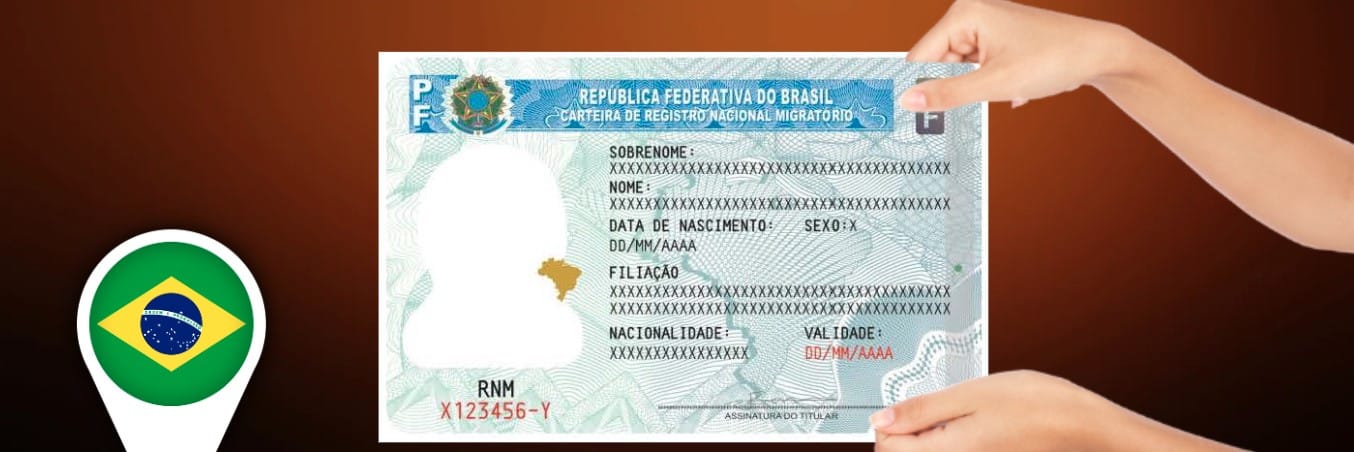The Ultimate Overview of the Brazilian RNM Card

The RNM Card (Registro Nacional Migratório) is a required document for foreign citizens planning to stay in Brazil for more than 90 days. Issued by the Federal Police, it serves as an official identification card for migrants, replacing the former RNE Card (Registro Nacional de Estrangeiros). This card is mandatory for foreigners who hold a temporary or permanent residence permit, allowing them to legally reside in Brazil for extended periods.
The importance of the RNM Card extends beyond legal residency. Having this document is essential for accessing several services in Brazil, such as opening a bank account, signing rental or work contracts, and even enrolling in local healthcare. Without it, engaging in these activities would be nearly impossible, which can significantly impact your quality of life if you are staying in Brazil for work, studies, or retirement.
A) Brazilian Immigration Rules for Stays Beyond 90 Days

Foreign citizens from developed countries, such as the United States, Canada, or those within the European Union, are generally allowed to stay in Brazil for up to 90 days on a tourist visa or even a visa waiver. While this is sufficient for short vacations or business trips, it presents a challenge for those who wish to remain in the country for a more extended period. Whether for work, study, retirement, or other personal reasons, staying in Brazil beyond these 90 days requires trying to secure an extension of the 90-day stay or a formal application for a particular type of visa or residency.
Brazil’s immigration system recognizes several visa categories that permit longer stays, including work visas, student visas, and retirement visas. However, after entering Brazil, you must initiate the process to formalize your residency status. This includes securing the RNM Card to ensure compliance with Brazilian law. Failure to secure proper documentation or overstaying the 90-day period can lead to penalties, including fines and potential bans on re-entry. For example, tourists who exceed their allowed stay may face fines of R$100 per day, up to a maximum of R$10,000. Additionally, overstaying a visa can result in deportation and other legal complications.
B) What is the RNM Card?

The RNM Card (Registro Nacional Migratório) is the primary document used to register foreign nationals residing in Brazil for extended periods. This card serves as official proof of your legal residency in Brazil and is not just a form of identification; it provides foreign residents with several legal protections and rights.
Once obtained, the RNM Card grants you access to a variety of essential services, including opening bank accounts, signing rental or work contracts, and enrolling in Brazil’s public or private healthcare system. Moreover, having the RNM Card allows you to travel freely in and out of Brazil without facing visa issues, as it confirms your residency status to Brazilian authorities and border control.
The process of obtaining the RNM Card typically begins with securing an appropriate visa, such as a work visa, student visa, or permanent residency through family reunification, investment, or other immigration paths. Once you have your visa or residency approved, you must apply for the RNM Card within 90 days of your arrival in Brazil or 30 days after having your residency approved – the earliest of these two dates. Failing to do so could result in legal complications, such as fines or difficulties or even cancellation of the approved visa or residency.
C) Who is Eligible for an RNM Card in Brazil?

To obtain an RNM Card, foreign citizens must meet specific eligibility criteria, which primarily depend on the type of visa or residency they hold and their intended stay in Brazil. Here are the main categories of individuals who qualify for an RNM Card:
1. Foreign Nationals with a Valid Residence Visa
The RNM Card is primarily for individuals who enter Brazil on a temporary or permanent residence visa. These visas can be obtained for a variety of reasons, including:
- Work visas for professionals and transferees.
- Student visas for individuals attending educational institutions in Brazil.
- Family reunification visas for those joining relatives who are Brazilian citizens or permanent residents.
- Investor visas for individuals making significant investments in the country.
- Retirement visas for individuals looking to retire in Brazil and meet specific financial requirements.
2. Digital Nomads and Remote Workers
With the rise of remote work, Brazil has also opened up opportunities for digital nomads who wish to live and work remotely from within the country. These individuals can apply for an RNM Card as long as they meet visa requirements, such as proving they have income from work abroad and no intention to work for a Brazilian company.
3. Special Circumstances: Refugees and Asylum Seekers
Brazil also provides the opportunity for individuals in special circumstances, such as refugees or asylum seekers, to apply for residency and obtain an RNM Card. These individuals must follow specific legal pathways to secure their status but are eligible for the same benefits once the card is issued.
4. Applicants for Permanent Residency
Some foreign nationals may qualify for permanent residency based on length of stay, marriage to a Brazilian citizen, or fulfilling investment criteria. Individuals who hold a permanent residence permit are eligible for an RNM Card that allows them to reside indefinitely in Brazil.
5. Individuals Transitioning from Tourist to Resident
Tourists who enter Brazil under a 90-day visa waiver or tourist visa may also be eligible to apply for a legal residence without leaving Brazil and, eventually, an RNM Card, provided they initiate the application process before their allowed time under a tourist visa expires. It is critical to begin the visa process early to avoid overstaying, which can result in fines and complications with immigration authorities.
D) Step-by-Step Guide: How to Obtain an RNM Card

Securing the RNM Card is an essential step for any foreign national wishing to stay in Brazil beyond the permitted 90 days. Below is a detailed step-by-step guide that outlines the process, ensuring a smooth application:
Step 1: Securing the Correct Visa or Residency
Before applying for the RNM Card, you must have the appropriate visa for your intended stay in Brazil. Visas are issued by the Brazilian Consulates and Embassies while the Legal Residencies are issued by the Brazilian Immigration through the Brazilian Federal Police in Brazil. Common visa and residency types that qualify for an RNM Card include:
- Work visas for those employed by Brazilian companies or investors.
- Student visas for those attending universities or educational institutions.
- Family reunification visas for joining a spouse, child, or parent who is a Brazilian citizen or permanent resident.
- Investor visas for individuals making substantial investments in Brazil.
- Retirement visas for foreigners with sufficient financial resources to retire in Brazil.
Securing the right visa or residency is the first and most critical step, as it sets the foundation for obtaining the RNM Card and ensures compliance with Brazilian immigration laws.
Step 2: Required Documentation for RNM Application
Once you have the visa or residency approved, you’ll need to gather several key documents to submit with your RNM Card application. These typically include:
- A valid passport.
- Apostilled Birth Certificate
- A proof of residence in Brazil (e.g., utility bill or rental agreement).
- The visa application form and any other required immigration documents previously filed.
- A criminal background check from your country of residence (or countries you’ve lived in within the last five years).
- Other documents depend on the type of residency.
Having all documents prepared and correctly translated is critical to avoid delays. Birth certificates and background checks may require a sworn translation depending on the residency.
Step 3: Scheduling an Appointment with the Federal Police
The next step is to schedule an appointment with the Federal Police, which handles immigration and residency matters. This appointment must be scheduled online via the Federal Police website. Once scheduled, you will attend the appointment at the nearest Federal Police station, where your documents will be reviewed and processed.
It’s essential to prepare for this appointment thoroughly, as the process can be time-consuming, and having all required documentation is necessary to avoid further delays.
Note: remember that you are not entitled to the RNM application until you have either a visa or a residency already fully approved!
Step 4: Submitting the Application
During your appointment with the Federal Police, you will submit your application, along with all required documents. The officers will collect your biometric data (fingerprints and photo), and they may ask additional questions about your purpose for staying in Brazil.
Once submitted, your RNM Card application will be processed. In some cases, you may receive a temporary registration document, allowing you to legally reside in Brazil while your RNM Card is being finalized.
Step 5: Follow-up and Processing Times
After submitting your application, processing times can vary depending on the Federal Police station and the complexity of your case. Typically, the RNM Card takes a few weeks to several months to process. You can track the status of your application through the Federal Police’s online portal.
Once your RNM Card is ready, you will need to schedule another appointment with the Federal Police to collect it. Ensure that you check regularly for updates to avoid any unnecessary delays in obtaining your card.
By following these steps carefully, foreign nationals can ensure a smooth application process for the RNM Card, securing their legal residency and accessing all the benefits Brazil has to offer.
E) How Long Does the RNM Card Last?

The duration of the RNM Card (Registro Nacional Migratório) depends on the type of visa you hold and your residency status in Brazil. For most foreign nationals, the RNM Card’s validity aligns with the type of visa granted. Below is a breakdown of how long the card typically lasts, based on different categories:
1. Temporary Residency
- If you are granted a temporary visa (such as a work, student, or digital nomad visa), the RNM Card will usually be valid for the same period as your visa. Temporary visas typically range from 1 to 2 years, depending on the visa type and your circumstances.
- After the initial period, you will need to renew your RNM Card if you plan to extend your stay. Renewal involves submitting updated documentation and possibly attending another appointment with the Federal Police.
2. Permanent Residency
- For those granted permanent residency in Brazil, the RNM Card may be valid for a longer period or indefinitely, depending on the conditions of your residency. Permanent residents, including retirees or individuals married to Brazilian citizens, often receive an RNM Card valid for up to 10 years.
- Permanent residents may also have the opportunity to renew their RNM Card or switch to a permanent card with fewer renewal requirements, depending on their status.
3. Renewal of the RNM Card
- It’s important to keep track of the expiration date of your RNM Card, as failing to renew it before it expires can result in fines or complications with your residency status. You are required to renew the card at least 90 days before its expiration. Renewing the card involves attending another appointment with the Federal Police, submitting updated documentation, and paying a renewal fee.
4. Leaving Brazil for Extended Periods
- If you have permanent residency and hold an RNM Card, you are allowed to leave Brazil, but there are restrictions. Foreigners with permanent residency should not stay outside Brazil for more than 2 years. If you exceed this period without presenting a valid justification, you may lose your residency status and, by extension, your RNM Card.
In summary, the duration of the RNM Card is closely tied to the type of visa and residency status you hold.
F) Benefits of Having an RNM Card in Brazil

Obtaining the RNM Card in Brazil provides foreign nationals with numerous legal and practical benefits, especially for those planning to live, work, or invest in the country. Below are some of the key advantages that come with holding an RNM Card:
1. Legal Residency Status
The RNM Card grants you legal residency in Brazil, ensuring that your stay complies with Brazilian immigration laws. This is particularly crucial if you plan to remain in the country for longer than the 90-day period typically allowed under a tourist visa. The card affirms your legal presence, protecting you from fines, deportation, or other legal consequences associated with overstaying.
2. Access to Financial Services
With an RNM Card, foreign nationals can open bank accounts in Brazil, which is essential for managing personal or business finances. Having a local bank account allows you to receive payments, make investments, and manage day-to-day expenses without relying on foreign accounts or currencies. This is particularly useful for individuals working in Brazil, students, retirees, or investors.
3. Ability to Sign Contracts and Conduct Business
The RNM Card also enables foreign residents to engage in essential activities, such as signing rental agreements, purchasing property, or entering into business contracts. Whether you are renting an apartment, buying a home, or starting a business, the card provides the legal framework to make these transactions possible.
4. Access to Public and Private Healthcare
Holding an RNM Card allows you to access both public and private healthcare services in Brazil. While emergency healthcare is available to all individuals in Brazil, having an RNM Card ensures that you are fully registered within the healthcare system and can benefit from a broader range of services. Many foreign residents also opt for private health insurance, which requires proof of residency.
5. Travel Flexibility
Once you have an RNM Card, you can travel in and out of Brazil without needing a visa for re-entry. This is a significant benefit for individuals who frequently travel for work or personal reasons. The card provides peace of mind, knowing that your residency status remains intact even if you leave the country temporarily.
6. Work and Employment Opportunities
Foreign nationals with an RNM Card can legally work in Brazil. This includes both formal employment with Brazilian companies and self-employment. Having the card is essential for foreigners seeking long-term career opportunities in Brazil’s diverse industries, ranging from technology to agriculture, tourism, and education.
7. Long-term Opportunities
The RNM Card is often a stepping stone toward obtaining permanent residency in Brazil. Many temporary visa holders eventually qualify for permanent residency, which offers even greater stability and benefits. Permanent residents enjoy additional rights, such as the ability to stay in Brazil indefinitely and access to more extensive social and economic benefits.
Overall, the RNM Card opens up a wealth of opportunities for foreign nationals, from securing financial stability and healthcare to ensuring legal residency and expanding business prospects. It is a critical document for anyone looking to integrate fully into Brazilian society.
G) Common Challenges Related to the RNM Card

Obtaining an RNM Card is a must for foreign nationals looking to reside in Brazil for extended periods, but the process can present several challenges. Below are common issues that foreign citizens may encounter, along with tips on how help navigate these situations.
1. What Happens if My Visa Application is Denied?
If your visa application is denied, it is important to understand the reasons for the denial, which are typically related to missing or incorrect documentation, ineligibility for the visa category, or a failure to meet Brazilian immigration requirements. In such cases, you may need to reapply after correcting the issues or file an appeal. Seeking professional legal assistance early on can help ensure that the correct documents are submitted and the process is handled efficiently. Once the damage is done, it may be difficult to undo it!
2. Can I Apply for the RNM Card After Arriving in Brazil?
Yes, you can apply for the RNM Card after arriving in Brazil, but you must already possess a valid visa or residency approved for a stay longer than the standard 90 days. The application for the RNM Card must be initiated within 90 days of your arrival and 30 days after securing a residency if that’s your case (the earlier of the two dates). If you enter on a tourist visa and later decide to switch to a residence visa from within Brazil, you must apply for the residency first, and only then can you apply for the RNM Card.
3. What Should I Do if I Lose My RNM Card?
Losing your RNM Card requires prompt action. You will need to report the loss to the local Civil Police by filing a Boletim de Ocorrência (police report example in Sao Paulo). Afterward, you must schedule an appointment with the Federal Police to apply for a duplicate RNM Card. It’s important to act quickly to avoid any legal complications.
4. How Do I Renew My RNM Card?
The renewal process for the RNM Card varies depending on whether you hold a temporary or permanent residency. For temporary residents, the card must be renewed before the expiration of your visa, typically every 1 to 2 years, ideally starting this process about 90 days before the expiration of your current RNM. Permanent residents may need to renew their card every 10 years or as required by specific residency regulations. The renewal process involves submitting updated documentation and attending another appointment with the Federal Police.
5. Can I Apply for Permanent Residency with an RNM Card?
Yes, the RNM Card serves as an essential step toward permanent residency. If you meet certain criteria, such as living in Brazil for a specified period under a temporary visa (e.g., through work, marriage, or investment), you may apply to change your residency status to permanent. Once granted permanent residency, your RNM Card will reflect your new status and will likely require less frequent renewals.
6. What Happens if I Overstay My Visa or RNM Card Expiration?
Overstaying your visa or allowing your RNM Card to expire can lead to legal complications. Foreign nationals who overstay are subject to daily fines (up to a maximum limit of R$10,000) and may face deportation. To avoid these penalties, ensure that you apply for visa extensions and renew your RNM Card well in advance.
7. How Can I get a Brazilian RNM Card?
You cannot directly apply for an RNM card in Brazil, as it is not a standalone benefit. Instead, the RNM card is a consequence of first securing an immigration benefit or residency authorization in the country. You must initially qualify for and obtain a residence permit—such as a digital nomad visa, retirement residency, marriage-based residency, or another qualifying track. Once your residency authorization is granted, you will be both entitled and required to apply for and obtain the RNM card as proof of your immigrant status.
8. What do I need to obtain a Brazilian RNM Card?
To obtain a Brazilian RNM card, you first need an immigration benefit or residency authorization in Brazil. You cannot apply directly for the RNM card. Instead, you must initially secure eligibility through specific immigration categories. Only after your residency has been approved will you be entitled—and indeed required—to apply for and receive your RNM card, confirming your official immigrant status in Brazil.
9. Is it possible to get an RNM card even though I have no plans to reside in Brazil?
Generally, obtaining a Brazilian RNM card requires securing a formal immigration benefit or legal residency in Brazil, such as retirement, digital nomad status, or marriage-based residency. However, Brazilian immigration authorities may, exceptionally, issue an RNM card to individuals who do not intend to reside in Brazil, if they have extenuating circumstances requiring a Brazilian residency document. For example, someone inheriting significant assets in Brazil who needs a local bank account or the ability to manage investments or operate stocks and shares on the Brazilian stock exchange might qualify for this exceptional grant. Nonetheless, these exceptions are not routine, and the vast majority of RNM cards are issued to individuals who have actively secured legal residency in Brazil.

